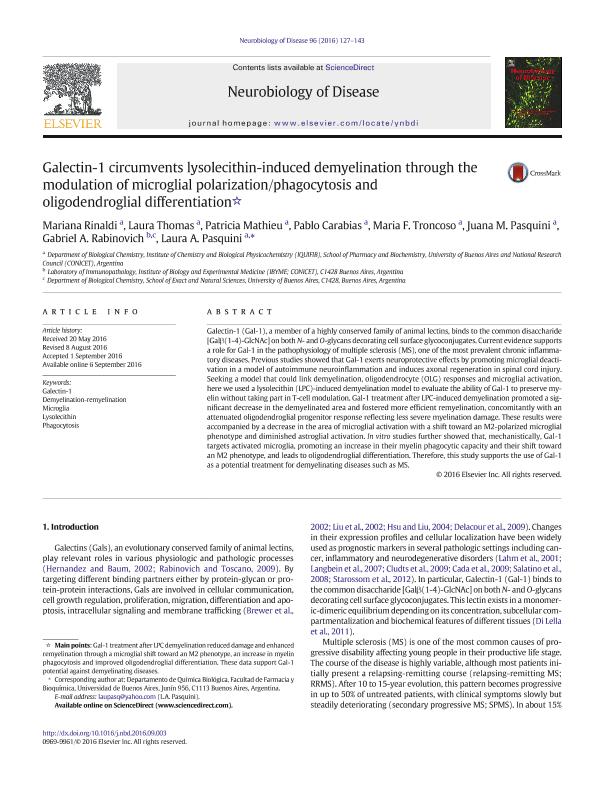Artículo
Galectin-1 circumvents lysolecithin-induced demyelination through the modulation of microglial polarization/phagocytosis and oligodendroglial differentiation
Rinaldi, Mariana ; Thomas, Laura
; Thomas, Laura ; Mathieu, Patricia Andrea
; Mathieu, Patricia Andrea ; Carabias, Pablo
; Carabias, Pablo ; Troncoso, María Fernanda
; Troncoso, María Fernanda ; Pasquini, Juana M.; Rabinovich, Gabriel Adrián
; Pasquini, Juana M.; Rabinovich, Gabriel Adrián ; Pasquini, Laura Andrea
; Pasquini, Laura Andrea
 ; Thomas, Laura
; Thomas, Laura ; Mathieu, Patricia Andrea
; Mathieu, Patricia Andrea ; Carabias, Pablo
; Carabias, Pablo ; Troncoso, María Fernanda
; Troncoso, María Fernanda ; Pasquini, Juana M.; Rabinovich, Gabriel Adrián
; Pasquini, Juana M.; Rabinovich, Gabriel Adrián ; Pasquini, Laura Andrea
; Pasquini, Laura Andrea
Fecha de publicación:
06/09/2016
Editorial:
Elsevier
Revista:
Neurobiology of Disease
ISSN:
0969-9961
e-ISSN:
1095-953X
Idioma:
Inglés
Tipo de recurso:
Artículo publicado
Clasificación temática:
Resumen
Galectin-1 (Gal-1), a member of a highly conserved family of animal lectins, binds to the common disaccharide [Galβ(1-4)-GlcNAc] on both N- and O-glycans decorating cell surface glycoconjugates. Current evidence supportsa role for Gal-1 in the pathophysiology of multiple sclerosis (MS), one of the most prevalent chronic inflammatory diseases. Previous studies showed that Gal-1 exerts neuroprotective effects by promoting microglial deactivation in a model of autoimmune neuroinflammation and induces axonal regeneration in spinal cord injury. Seeking a model that could link demyelination, oligodendrocyte (OLG) responses and microglial activation, here we used a lysolecithin (LPC)-induced demyelination model to evaluate the ability of Gal-1 to preserve myelinwithout taking part in T-cell modulation. Gal-1 treatment after LPC-induced demyelination promoted a significant decrease in the demyelinated area and fostered more efficient remyelination, concomitantly with an attenuated oligodendroglial progenitor response reflecting less severe myelination damage. These results were accompanied by a decrease in the area of microglial activation with a shift toward an M2-polarized microglial phenotype and diminished astroglial activation. In vitro studies further showed that, mechanistically, Gal-1 targets activated microglia, promoting an increase in their myelin phagocytic capacity and their shift toward an M2 phenotype, and leads to oligodendroglial differentiation. Therefore, this study supports the use of Gal-1 as a potential treatment for demyelinating diseases such as MS.
Palabras clave:
Galectin-1
,
Demyelination Remyelination
,
Microglia
,
Lysolecithin
,
Phagocytosis
Archivos asociados
Licencia
Identificadores
Colecciones
Articulos(IBYME)
Articulos de INST.DE BIOLOGIA Y MEDICINA EXPERIMENTAL (I)
Articulos de INST.DE BIOLOGIA Y MEDICINA EXPERIMENTAL (I)
Citación
Rinaldi, Mariana; Thomas, Laura; Mathieu, Patricia Andrea; Carabias, Pablo; Troncoso, María Fernanda; et al.; Galectin-1 circumvents lysolecithin-induced demyelination through the modulation of microglial polarization/phagocytosis and oligodendroglial differentiation; Elsevier; Neurobiology of Disease; 96; 6-9-2016; 127-143
Compartir
Altmétricas



